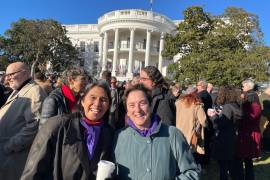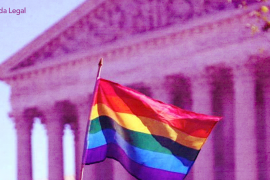
What Happened at the Supreme Court?
Blog Search
This is it! We are headed to the U.S. Supreme Court to argue for the freedom to marry!
Yesterday afternoon, the Supreme Court announced it would hear the appeals from all six marriage cases decided by the U.S. Sixth Circuit Court of Appeals. You may remember that, in early November, the Sixth Circuit upheld laws banning marriage for same-sex couples from four states, in stark contrast to the blizzard of federal and state court decisions that have found identical laws unconstitutional over the last year and a half.
Listen to a teleconference from the day the Court accepted these cases moderated by Lambda Legal's Director of Education and Public Affairs, Leslie Gabel-Brett, featuring Jon Davidson, Legal Director, and Camilla Taylor, National Marriage Project Director:
Which cases were chosen?
Ohio: Obergefell v. Hodges and Henry v. Hodges, litigated by Lambda Legal, the ACLU and private counsel at Gerhardstein & Branch.
Michigan: DeBoer v. Snyder, litigated by GLAD and private counsel.
Tennessee: Tanco v. Haslam, litigated by NCLR and private counsel.
Kentucky: Bourke v. Beshear and Love v. Beshear, litigated by the ACLU and private counsel.
Having all of these cases together before the Court means that we have an amazing array of family stories illustrating why having access to marriage is so important to same-sex couples— from cradle to grave.
What did the Court say?
The Court order said that all of the cases above are consolidated and that we should brief the following questions:
1) Does the Fourteenth Amendment require a state to license a marriage between two people of the same sex?
2) Does the Fourteenth Amendment require a state to recognize a marriage between two people of the same sex when their marriage was lawfully licensed and performed out-of-state?
The Fourteenth Amendment protects individuals against unwarranted restrictions on their liberty and equal treatment, the core arguments we have been making and prevailing on in our marriage cases. The briefing from both sides will be concluded by April 17th. We don’t yet know when arguments will be held, but it likely will be very soon after the briefing is over.
Meet Joe and Rob, one of the Ohio couples fighting for marriage at the Supreme Court:
What happens if we win?
We will finally have the freedom to marry for same-sex couples all across the country – a goal we have been seeking to achieve for decades. Same-sex couples who choose to marry and their children will at last be able to obtain all the same protections, rights and responsibilities long available to different-sex couples who marry and their families, and no government will be allowed to discriminate against them or treat them any differently. (Some local and state officials may resist and still discriminate against same-sex couples who seek to marry or who have married – but we will fight them and defend our rights if they do!)
Another important part of the victory will be having the Supreme Court rule – again – that the U.S. Constitution protects the rights of lesbians, gay men, and bisexuals, and that laws that harm us or treat us unfairly because of who we are or whom we love can no longer stand.
All the cases, political advocacy and educational efforts to advance the freedom to marry have set the stage for this – we already have 36 states and the nation’s capitol where same-sex couples may marry, many thousands of couples are already happily married and public support for marriage equality has never been higher!
What if we lose?
If the Supreme Court were to rule that the U.S. Constitution does not protect same-sex couples’ right to marry and does not require states to respect marriages same-sex couples lawfully have entered in other jurisdictions, a number of issues would arise.
With respect to same-sex couples who already have legally married, Lambda Legal strongly believes that those marriages will remain valid and will need to continue to be respected by the states in which those marriages were entered. Just this past week, a federal district court in Michigan ruled along the same lines with respect to the marriages 300 same-sex couples entered in that state before the 6th Circuit's adverse ruling. Nonetheless, the validity of same-sex couples' marriages may be challenged and those couples may want to take additional steps (such as executing wills and durable health care powers of attorney and securing second parent adoptions) to provide them and their families extra peace of mind and security.
With respect to whether same-sex couples would be able to marry and would have their marriages respected in other states, that would vary from state to state. States in which marriage equality was achieved by a ruling under the state's constitution, by legislative reform or at the ballot box would be unaffected.
Unmarried same-sex couples in Kentucky, Michigan, Ohio, and Tennessee (the states whose marriage laws the Supreme Court just agreed to review) and in any state that manages to overturn an existing federal ruling would be forced to seek reform through the political process.
States in which a final judgment has been obtained in federal court would be required to continue to allow same-sex couples to marry and to respect out-of-state marriages entered by same-sex couples unless and until someone with standing makes a motion to reopen the judgment and that motion is granted (unless stays are properly obtained before then). In some states, there may be no one with standing interested in seeking to set aside the existing judgment.
Same-sex couples in states in which a judgment is on appeal or can still be appealed, where the judgment has not been stayed, should be able to continue to marry and to have their out-of-state marriages honored by the state unless and until the existing judgment is stayed or reversed. Depending on how the Supreme Court rules, there may be other arguments that can be advanced to defend these judgments.
There's no question that it would be a mess. This is yet another, powerful reason why the Supreme Court should reverse the 6th Circuit's aberrant decision and hold that same-sex couples, like all other couples, share the fundamental right to marry and that it violates federal guarantees of equality and liberty to refuse to allow them to marry or to deny recognition to the marriages they lawfully have entered in other states.
Will we win?
Until we have the Court’s decision – likely in June – nothing is certain. But the case law that we and our partner legal organizations at the ACLU, GLAD and NCLR, with the private bar, have built over the years is very solid, and the wind is at our backs.
It is a very sweet moment – all our amazing plaintiff couples and families and all of the national LGBT legal organizations and private bar partners will be carrying these cases to the Supreme Court together. The lawyers on these cases have been working for this moment for decades and it is wonderful to know that we will be seeing through what we hope will be the last chapter of this particular battle together.
Even a victory, however, will not be the end of our work. In states where same-sex couples already may marry, we have needed to fight unequal treatment of our families and efforts to pass overly broad, dangerous laws licensing businesses to discriminate against same-sex couples. Moreover, much critical work still remains to be accomplished to bring full equality, liberty and dignity to all LGBT people and people living with HIV – in schools, at work, in health care, and in the youth in out-of-home care, senior care, immigration and criminal justice systems. The road remains long, but the path ahead is lit like never before.




